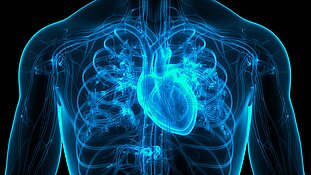Press release of the Heidelberg University Hospital (UKHD)
Scientists from the Heidelberg University Hospital and the Sorbonne University in Paris publish study results in the renowned journal Circulation / The cardiooncology section of the Heidelberg University Hospital and the National Center for Tumor Diseases (NCT) Heidelberg provides interdisciplinary care for around 1,200 cancer patients with cardiac damage resulting from cancer therapy every year
Chemotherapy or immunotherapy for cancer can also affect the heart - these side effects are rare, but in the worst case, they can damage the heart irreparably. Scientists at the Heidelberg University Hospital and the Sorbonne University in Paris have recently discussed a reliable marker for the severity of heart damage caused by specific immunotherapy in the renowned scientific journal "Circulation." This marker is actually an "old acquaintance": it is the cardiac muscle protein troponin, which has been used to diagnose heart attacks for around 35 years. In a study of 60 cancer patients who developed heart problems after treatment with so-called Immun-Checkpoint-Inhibitoren (immune checkpoint inhibitors), the protein troponin T indicated a severe course of myocarditis with an increased risk of complications and death above a specific threshold value in the blood. The German Center for Cardiovascular Research selected the article as "Paper of the Month" in June.
In order to increase the efficiency of the body's immune system against tumors, immune checkpoint inhibitors have been increasingly used in cancer therapy for several years. Their development led to a breakthrough in the treatment of some tumor diseases that were previously difficult or impossible to treat, such as advanced black skin cancer. However, since these drugs act on an essential regulatory mechanism of the immune system that prevents attacks against the body's own tissue, life-threatening inflammation of various organs can occur during treatment. "Inflammations of the heart are particularly critical in this context, as serious heart damage can quickly occur for some of those affected if the severity of the inflammation is not recognized and no countermeasures are taken in time," explains Professor Dr. Norbert Frey, Medical Director of the Clinic for Cardiology, Angiology, and Pneumology at the UKHD. "There is still a lack of prognostic factors to identify patients with higher risks for severe outcomes as early as possible ."
Around one percent of all patients who receive immune checkpoint inhibitors develop myocarditis. Since the inflammation tends to not show symptoms initially, the treatment guidelines recommend regular heart checks in the first months of immunotherapy. This detects cardiac proteins such as troponin-T, which only enter the blood in larger quantities when the heart muscle has been damaged. "Until now, this only led to the conclusion that the heart was damaged as such. Based on our study, we have now defined a precise threshold value: if the amount of troponin-T in the blood rose above this value in the first 72 hours after administration of the immunotherapeutics, the patients had a high risk of developing a serious cardiac complication such as arrhythmia or heart failure over the course of the next 90 days," said first author Professor Dr. Lorenz Lehmann, Department of Cardiology, Angiology and Pneumology at the UKHD. "In contrast, the risk was low in patients whose troponin-T was below the threshold. Based on our results, Troponin-T could be an excellent marker to identify the patients who need close monitoring and possibly more intensive cardiac support in a reliable and practical way." The results still need to be confirmed in further studies before they can be used in practice.
Prof. Lehmann manages the Cardio-Oncology Section of the Department of Cardiology and the National Center for Tumor Diseases (NCT) in Heidelberg. At the NCT Heidelberg, around 1,200 patients with heart diseases resulting from cancer therapy are medically attended through a special consultation every year. So far, this service is unique in Germany and, thus, serves as a supra-regional point of contact for those affected.
The publication
Lehmann LH, Heckmann MB, Bailly G, et al. Cardiomuscular Biomarkers in the Diagnosis and Prognostication of Immune Checkpoint Inhibitor Myocarditis [published online ahead of print, 2023 Jun 15]. Circulation. 2023;10.1161/CIRCULATIONAHA.123.062405. doi:10.1161/CIRCULATIONAHA.123.062405
More information online
Cardio-Oncology Section at the UKHD
Cardio-Oncology Heidelberg
Contact
Prof. Dr. Lorenz Lehmann
Head of the Cardio-Oncology Section
Department of Cardiology, Angiology and Pneumology of the UKHD
Phone: 06221 56-38448
E-Mail: Lorenz.Lehmann@med.uni-heidelberg.de
You can also find this press release (available in German only) online in the UKHD Newsroom.
Heidelberg University Hospital and Faculty of Medicine: Internationally Renowned Patient Care, Research and Teaching
Heidelberg University Hospital (Universitätsklinikum Heidelberg, UKHD) is one of the largest and most prestigious medical centers in Germany. The Medical Faculty of Heidelberg University (Medizinische Fakultät Heidelberg, MFHD) belongs to the internationally renowned biomedical research institutions in Europe. Both institutions have the common goal of developing new therapies and implementing them rapidly for patients. Heidelberg University Hospital and the Medical Faculty of Heidelberg University employs around 14.500 employees and is committed to providing trainings and qualifications. Every year, around 86,000 patients and more than 1.100.000 outpatient cases are treated in more than 50 clinical departments with almost 2.500 beds. Together with the German Cancer Research Center (Deutsches Krebsforschungszentrum, DKFZ) and the German Cancer Aid, the UKHD established the first National Center for Tumor Diseases (NCT) in Heidelberg. The goal is to provide care at the highest level as an oncology center of excellence and to rapidly transfer promising approaches from cancer research to the hospital. In addition, the UKHD operates in partnership with the DKFZ and the University of Heidelberg the Hopp Children’s Cancer center Heidelberg (KiTZ), a unique and nationally known therapy and research center for oncological and hematological diseases in children and adolescents. The Heidelberg Curriculum Medicinale (HeiCuMed) is one of the top medical training programs in Germany. Currently, there are about 4.000 future physicians studying in Heidelberg.
www.klinikum.uni-heidelberg.de
Julia Bird
Comm. Press Officer
Comm. Head of Corporate Communications
Tel. +49 6221 56-7071
Fax. +49 6221 56-4544
julia.bird@med.uni-heidelberg.de






